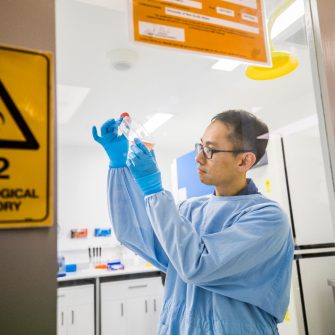Master of Engineering Science (Food Process Engineering)
- Commencing Terms
- Term 1, 2 & 3
- Duration
- 1 - 2 Year(s)
- Delivery Mode
- Face-to-face (includes blended)
- Campus
-
Kensington
- Codes
- Program code 8338
-
Commonwealth Supported Places are available for this program2025 Indicative CSP first year fee
- $9,500*
-
2025 Indicative CSP fee to complete degree
- $19,000*
-
2025 Indicative first year full fee
- $58,000*
-
2025 Indicative full fee to complete degree
- $121,000*


UNSW is introducing a new academic calendar from 2028.
What does this mean for my studies? UNSW is moving to a new ‘flex-semester’ calendar.
- Overview
- Entry requirements
- What will I study?
- Future careers
- How to apply
- Fees & Scholarships
Overview
The Master of Engineering Science in Food Process Engineering is a two-year postgraduate degree offered by Australia’s leading engineering faculty. This allows you to specialise in food processing and food manufacturing.
Designed for students with a four-year accredited engineering degree, this program broadens your career opportunities through cross-training, re-training, or specialisation. You will learn the latest processing technologies and the core principles of food engineering.
Your studies will cover essential areas, such as:
- Food engineering
- Product quality
- Food safety and quality assurance
- Food packaging
- Industry best practices in food technology
Our flexible study options in Food Process Engineering provide a deeper understanding of the food manufacturing industry. Learn from experts in food process engineering and food scientists who will equip you with strategies and tools to enhance efficiency and performance in food production.
The Master of Engineering Science program emphasises flexible learning as a keystone of the program. In this postgraduate degree, you will dive deeper into processing technology, the rheological properties and engineering of different foods, shelf-life, thermal and nonthermal processing and the life cycle of plants.
Why study at UNSW?
UNSW has been a pioneer in Food Science, Technology, and Nutrition for over 65 years and has a strong focus on developing sustainable solutions in the energy, resources, health and food sectors both nationally and internationally.
We're ranked #1 in Australia and #25 globally for Engineering and Technology. All eight of UNSW's Engineering schools are ranked in the global top 50 with two schools ranked in the global top 10 for Engineering subjects (QS World University Rankings by Subject, 2025).
You will study in world-class facilities alongside leading experts who are also dedicated teachers and mentors. In 2019, the ERA Research Excellence ranked us five-stars in Food Sciences, the highest possible rating. For over 65 years, the school has been at the forefront of research and teaching excellence.
Benefits of studying with us:
- Strong partnerships with industry in education, research, training, and employment.
- Learn in new facilities with purpose-built modern laboratories and collaborative learning spaces.
- Work-integrated learning elective allows you to apply what you learn in industry placements as part of your degree.
- UNSW is known for its graduate employability, with UNSW awarded the Most Employable students for six years in a row (Australian Financial Review (AFR) Top100 Future Leaders Awards, 2020-2025).
Want to see more from UNSW Engineering?
Entry requirements
There are two entry points into this Master of Engineering Science specialisation depending on your cognate background. This provides a structured and supportive option for students with a non-cognate background, while enabling students with cognate backgrounds earlier flexibility in their course selection. Both entry points equate to the same duration of 2 years (96 UOC), and differ only in the order and structure of core foundation courses.
Students with a cognate background:
Entry into the Master’s program requires completion of a 4-year Bachelor of Engineering degree (or equivalent) or 3-year Engineering Science degree in a cognate discipline. A minimum 65% average, or its equivalent, throughout the qualifying bachelor’s degree is mandatory.*
Students with a non-cognate background:
Students with a non-cognate background can enter the Master of Engineering Science via the Graduate Certificate in Engineering Science/Master of Engineering Science pathway.
Entry into the pathway requires completion of a 4-year Bachelor of Engineering degree (or equivalent) or 3-year Engineering Science degree in any engineering discipline.
A minimum 65% average, or its equivalent, throughout the qualifying bachelor’s degree is mandatory.*
Successful applicants will be offered entry to the Master of Engineering Science via the Graduate Certificate in Engineering Science/Master of Engineering Science pathway. Students can transition to the Master of Engineering Science after passing 18 UOC of foundational courses. The total study duration is the same as the entry point for students with a cognate background (2 years/ 96 UOC). There is no separate application required for this pathway. Applicants with non-cognate backgrounds must apply for the Master of Engineering Science to be considered for this entry.
*Qualifications from non-211 Chinese Universities will require a 70% average
| Cognate Discipline | |
|
|
Recognition of Prior Learning (Credit Transfer)
UNSW recognises that many students have professional experience or relevant previous studies. If you have worked in a relevant industry or have relevant previous study experience, you may be eligible for credit points that would enable you to complete your Master of Engineering Science in as little as one year, or another accelerated option listed below dependent on your previous study and experience.
English language requirements
You may be asked to provide evidence of your English proficiency to study at UNSW depending on your educational background and citizenship. English language skills are vitally important for coping with lectures, tutorials, assignments and examinations - this is why UNSW requires a minimum English language competency for enrolment.
If you’re completing an Australian Year 12 qualification (e.g. NSW HSC or equivalent), you do not need to provide anything extra to prove your proficiency. Your qualification will be used as evidence of your English proficiency.
If you do need to provide evidence of your English proficiency, this will be indicated in your application. You can prove this by providing evidence that you meet one or more of the following criteria:
- English language tests and university English courses
- Prior study in the medium of English
- Other qualifications
If you need to improve your English skills before you start your degree, UNSW College’s Academic English Programs are for you. The programs are suitable for various English levels and help you prepare for university studies and life in Australia.
For more details, visit the English Language Requirements page.
There are two entry points into this Master of Engineering Science specialisation depending on your cognate background. This provides a structured and supportive option for students with a non-cognate background, while enabling students with cognate backgrounds earlier flexibility in their course selection. Both entry points equate to the same duration of 2 years (96 UOC), and differ only in the order and structure of core foundation courses.
Students with a cognate background:
Entry into the Master’s program requires completion of a 4-year Bachelor of Engineering degree (or equivalent) or 3-year Engineering Science degree in a cognate discipline. A minimum 65% average, or its equivalent, throughout the qualifying bachelor’s degree is mandatory.*
Students with a non-cognate background:
Students with a non-cognate background can enter the Master of Engineering Science via the Graduate Certificate in Engineering Science/Master of Engineering Science pathway.
Entry into the pathway requires completion of a 4-year Bachelor of Engineering degree (or equivalent) or 3-year Engineering Science degree in any engineering discipline.
A minimum 65% average, or its equivalent, throughout the qualifying bachelor’s degree is mandatory.*
Successful applicants will be offered entry to the Master of Engineering Science via the Graduate Certificate in Engineering Science/Master of Engineering Science pathway. Students can transition to the Master of Engineering Science after passing 18 UOC of foundational courses. The total study duration is the same as the entry point for students with a cognate background (2 years/ 96 UOC). There is no separate application required for this pathway. Applicants with non-cognate backgrounds must apply for the Master of Engineering Science to be considered for this entry.
*Qualifications from non-211 Chinese Universities will require a 70% average
| Cognate Discipline | |
|
|
Recognition of Prior Learning (Credit Transfer)
UNSW recognises that many students have professional experience or relevant previous studies. If you have worked in a relevant industry or have relevant previous study experience, you may be eligible for credit points that would enable you to complete your Master of Engineering Science in as little as one year, or another accelerated option listed below dependent on your previous study and experience.
Admission pathways
If you do not meet the requirements for direct entry into your chosen degree, you may be eligible for a pathway program with UNSW College. UNSW College provides alternative entry options using university-approved content so that you can start your UNSW journey with confidence.
English language requirements
You may be asked to provide evidence of your English proficiency to study at UNSW depending on whether you are from an English-speaking background or non-English speaking background. English language skills are vitally important for coping with lectures, tutorials, assignments and examinations - this is why UNSW requires a minimum English language competency for enrolment.
If English is not your first language, you’ll need to provide proof of your English proficiency before you can be given an offer to study at UNSW. You can do this by providing evidence that you meet one or more of the following criteria:
- English language tests and university English courses
- Prior study in the medium of English
- Other qualifications
If you need to improve your English skills before you start your degree, UNSW College’s Academic English Programs are for you. The programs are suitable for various English levels and help you prepare for university studies and life in Australia.
For more details, visit the English Language Requirements page.
Check the specific English language requirements for this program
Program structure
When you study a Master of Engineering Science, you will choose from one of 26 specialisations which will help you make your next career move.
Within these specialisations your study will include:
- Foundational courses
- Disciplinary courses
- Advanced disciplinary courses
- Engineering and Technical Management Courses
- Enquiry-based courses (Product development or research thesis)
You will be able to tailor your degree to your interests by combining courses in your chosen specialisation with elective courses.
You will also have the chance to work on a complex, open-ended enquiry-based research project.
Full program structure
Degree structures can vary depending on your specialisation of choice, the number of courses you choose and timetabling, to give you an indication you can consider the below.
Depending on your specialisation and your previous studies/professional experience you may study:
- 2 Foundational courses
- 7 Disciplinary Courses (4 core and 3 electives)
- 3 Advanced Disciplinary Courses (1 core and 2 electives
- 1 Engineering and Technical Management Course
- 3 Enquiry-based courses (which include a research project or product development courses)
You will acquire the technical knowledge and skills needed for your chosen specialisation through the Disciplinary and Advanced Disciplinary Knowledge courses. You will also stay updated on cutting-edge developments in your area of interest.
- Advanced Disciplinary and Disciplinary Core Courses such as Unite Operations in Food Engineering, Advanced Food Engineering, Advanced Processing Technologies, Advanced Process Control, and Membrane Processes are designed to sharpen your technical mastery and keep you at the forefront of industry innovation.
- Master the essentials of launching a startup, gain real-world skills to successfully commercialise your ideas through a hands-on course designed for tomorrow’s innovators.
- Science Technical Management electives will help you:
- build your ability to communicate and defend critical decisions with clarity and confidence,
- apply ethical frameworks to solve complex challenges
- developing leadership agility to drive projects, inspire teams, and shape strategy in high-stakes environments.
- You will complete a research project or a product design and development within the enquiry-based courses. You can use this course to refine research capabilities for postgraduate success, build a foundation for a future PhD or step into an industry leadership role to tackle global challenges in sustainability, food security, and R&D.
Future careers
UNSW Food graduates are in high demand due to their high skill level, with excellent employment opportunities in the food and beverage industries, university and CSIRO research, and government regulatory bodies such as FSANZ. Graduates of the Master of Engineering Science in Food Processing Engineering can pursue a range of professional opportunities in roles including:
- Food process engineer
- Automation engineer
- Bioprocessing engineer
- Packaging engineer
- Food waste reduction engineer
- Supply chain engineer
- Food safety systems manager
- Validation engineer
- Cold chain specialist
- 3D food printing specialist
- Digital twin engineer
- Precision fermentation engineer
UNSW Engineering graduates are some of the most sought-after professional engineers in Australia and abroad thanks to the reputation of our research and teaching.
How to apply
Applications must be submitted through our Apply Online portal. We encourage you to submit your completed application as early as possible to ensure it will be processed in time for your preferred term. Some high-demand programs and Faculties with limited places may have an earlier application deadline or commencement date. Find out more.
Ready to start your application?
For most international students, applications are submitted via our Apply Online, opens in a new window service. We encourage you to submit your completed application as early as possible to ensure it will be processed in time for your preferred term.
Some high-demand programs with limited places, may have an earlier application deadline or may have an earlier commencement date. For more information visit our international applicant information page.
Ready to start your application?
Fees & Scholarships
You may be eligible for a Commonwealth Supported Place (CSP) for this degree. Domestic students who receive a CSP will have a substantial proportion of their fees subsidised by the Australian government. Start your postgraduate application today with our guide on how to apply.
Commonwealth Study Assistance, such as Austudy and Youth Allowance, is available for some master's degrees. For the most up-to-date information and list of degrees, visit UNSW Current Student Financial Support.
*The indicative Commonwealth Supported Place (CSP) fees are an estimate based on the relevant student contribution band/s for a Commonwealth Supported Place undertaking a standard full-time load of 48 units of credit per year (1 Equivalent Full Time Student Load/1 EFTSL). To find out more about Commonwealth Supported Places visit Postgraduate Commonwealth Support.
Indicative fees are a guide only and have been calculated based on the typical enrolment patterns of students undertaking the degree/program. The indicative fee listed here is an estimate for tuition only and excludes non-tuition fees and charges. The amount you pay will vary depending on the calendar year of enrolment, the courses you select and whether your study load is more or less than 1 Equivalent Full Time Student Load (48 units of credit (UOC) per year).
You should not rely on indicative fees as fee increases are assessed when required and may exceed the indicative figures listed here. Actual fees are calculated on enrolment. More information on fees can be found at the UNSW fees website.
*Fees are subject to annual review by the University and may increase annually, with the new fees effective from the start of each calendar year. The indicative fees listed here are based on an estimated average and are for tuition only, other fees and charges are not included. The amount you pay will vary depending on the calendar year to enrol, the courses you select and whether your study load is more or less than 1 Equivalent Full Time Student Load (8 courses per year).
Indicative fees are a guide for comparison only based on current conditions and available data. You should not rely on indicative fees. More information on fees can be found at the UNSW fees website.
Indicative fees to complete the program have been calculated based on a percentage increase for every year of the program. Fee increases are assessed annually and may exceed the indicative figures listed here.
Indicative fees to complete the program include tuition plus an estimate of study-related costs of approximately $1,000 per year. To find out more about other costs, visit UNSW International.
Scholarships
At UNSW, we award over $83 million in scholarships each year. We pride ourselves on rewarding excellence and making university accessible to students from all walks of life. Whether you’re a domestic or international student, our range of scholarships, prizes and awards can support your journey.
Featured scholarship
The UNSW Women in Engineering Research Scholarship was established to assist women of high academic achievement with an interest in a research and/or an academic career in engineering. UNSW Engineering offers two Women in Engineering Top-up Scholarships every semester.
Apply here and search for ‘Engineering’ in the keywords.

QS World University Rankings, 2025

AFR Top100 Future Leaders Awards, 2020-2025

#1 Australian uni attended by start-up founders




